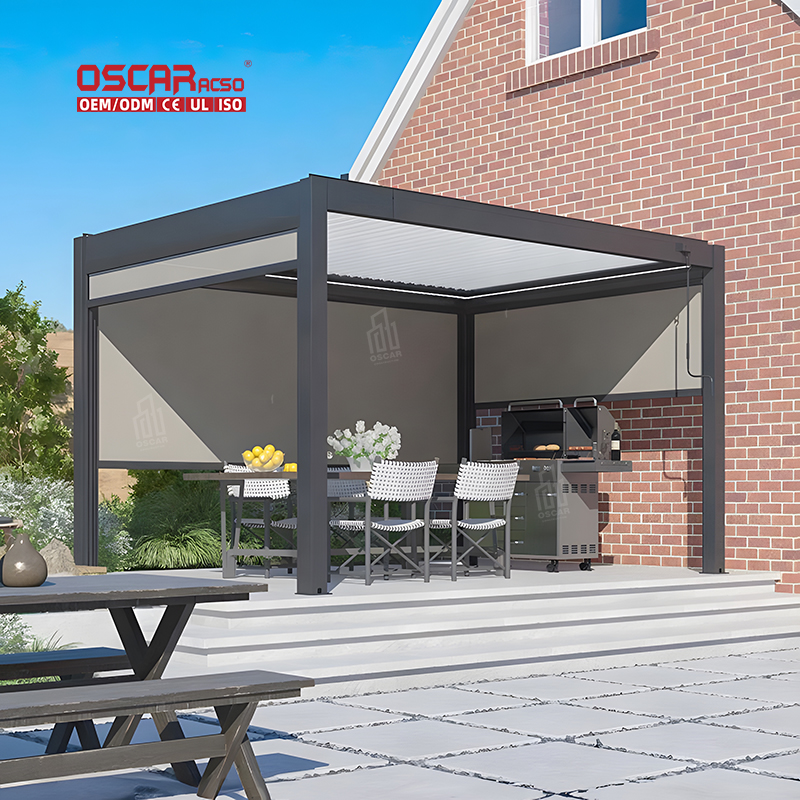How Many Posts Does a Pergola Need, Unveiling the Blueprint for Stability and Style
So, you\'re dreaming of adding a pergola to your outdoor space? It\'s a fantastic way to create a shaded haven for relaxat...
.jpg)
So, you’re dreaming of adding a pergola to your outdoor space? It’s a fantastic way to create a shaded haven for relaxation and entertaining. But before you start, one of the most fundamental questions to answer is: how many posts does this structure actually need? Let’s dive into the details that determine the answer.
The Standard Answer: Four Posts
For a typical, standard-sized pergola—think a classic 10’x10′ or 12’x12′ structure—the go-to configuration is four vertical posts. These posts act as the main pillars, providing essential support for the entire framework of beams and rafters that sit on top. This setup is a timeless choice for creating an intimate seating area or a defined space over a patio.
However, the number of posts isn’t a one-size-fits-all matter. It’s primarily influenced by the size and span of your desired pergola.

When Four Posts Aren’t Enough
As a pergola grows wider or longer, the distance between its posts increases. This longer span can compromise stability, especially under heavy wind or the weight of climbing plants or a shade cloth. How do you know if you need more support?
A good rule of thumb is that for pergolas whose dimensions exceed a standard module, such as those with a width greater than 4.5 meters (approx. 15 feet) and a generous overhang, you’ll likely need to double the number of posts to eight. This ensures the weight is distributed evenly and the structure remains strong and secure.
Larger pergolas, like a 12×20 feet design, often encourage more creativity and require additional posts for paramount stability. For a sizable structure like this, sticking to only four posts would be risky. The largest recommended size for a four-post pergola is typically around 12×20 feet; beyond that, additional posts become necessary to prevent sagging and ensure safety.
➡️ Why is this important?Uns supported gaps between posts can lead to timber sagging over time, compromising both the aesthetics and structural integrity of your beautiful new addition.
Size and Spacing: The Dynamic Duo
The number of posts is intimately tied to their spacing. You can’t have one without considering the other.
- •
Standard post spacing typically falls between 8 to 10 feet apart.
- •
For larger structures, a maximum spacing of 12 feet can be considered, but this requires additional reinforcement to prevent any potential sagging.
- •
Proper placement is key; it enhances both the functionality and the long-term durability of your pergola.
Getting this right is crucial. It’s like building a strong foundation for a house—everything else depends on it.
More Than Just Count: Post Dimensions and Installation
It’s not just how manyposts you use; the sizeof those posts and how you install themare equally critical for a sturdy pergola.
Choosing the Right Post Size:
- •
4×4-inch posts: These are best suited for smaller pergolas, particularly when the distance between two posts is less than six feet.
- •
6×6-inch posts: This is the highly recommended and most common choice for standard and larger pergolas. They offer greater durability, strength, and a more substantial appearance, better resisting warping and twisting over time.
Installing for Maximum Stability:
.jpg)
- •
Dig Deep: Post holes should be dug to a depth of at least 24 inches (or deeper if local frost lines require it) to ensure solid anchoring.

- •
Secure Firmly: Posts should be set in concrete or secured with heavy-duty anchor bolts to a concrete footing for a robust foundation.
- •
Keep ‘Em Straight: Use a level to ensure each post is perfectly vertical before the concrete sets.
Aesthetically, thicker 6×6 posts often provide a more robust and pleasing visual impact, making the structure look more permanent and well-crafted.
So, How Do You Decide for Your Project?
Figuring out the perfect post setup for your pergola involves considering a few key factors. Ask yourself:
- •
What are the overall dimensions? Measure the length and width of your planned structure.
- •
What is the intended use? Will it simply be for shade, or will it support heavy climbing plants, a swing, or an outdoor fan?

- •
What do local building codes require? Always check this first! Regulations can vary and may specify requirements for structural supports.
For most backyard projects, a four-post pergola made from 6×6 lumber is a fantastic and safe starting point. But if your design is ambitious and spacious, embracing a six or even eight-post plan is the wisest path to a lasting and secure outdoor feature.
Remember, a well-built pergola is more than just a pretty addition; it’s an investment in your home’s outdoor living space. Taking the time to plan the right support system ensures it will be a source of enjoyment for many years to come.

